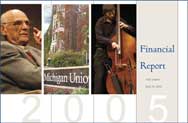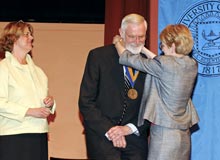

 The Longone Center for American Culinary Research at the Clements Library served up a large slice of Americana in May with a three-day American culinary history symposium to mark the dedication of the Janice Bluestein
Longone Archive.
The Longone Center for American Culinary Research at the Clements Library served up a large slice of Americana in May with a three-day American culinary history symposium to mark the dedication of the Janice Bluestein
Longone Archive.
The donation of thousands of items relating to American culinary history comes from Daniel and Janice Longone of Ann Arbor. The Longone Archive is a rich collection of primary-source materials in all formats relating to the history of food in America prior to the mid-20th century.
 The Gerald R. Ford School of Public Policy celebrated its 90th anniversary in November with a visit from the former president and a ceremonial groundbreaking of the Joan and Sanford Weill Hall as the School’s new home.
The Gerald R. Ford School of Public Policy celebrated its 90th anniversary in November with a visit from the former president and a ceremonial groundbreaking of the Joan and Sanford Weill Hall as the School’s new home.
Ford, a 1935 U-M graduate, led the groundbreaking ceremony for the new Weill Hall building, located on the corner of State and Hill streets. The 80,000-square-foot facility will feature classrooms, a library, research centers, a computer laboratory, faculty offices, and public spaces for conferences and lectures. Construction should be completed by fall 2006.
The Michigan Union celebrated its 100th anniversary in October 2004 with a series of public events during its Centennial Celebration Gala Weekend, among them a time capsule unveiling ceremony; a pep rally with the Michigan Fanfare Band, cheerleaders, and football coach Lloyd Carr; and a gala dinner in the Ballroom, featuring former football coach Bo Schembechler and performances by the U-M Men’s Glee Club.
 The U-M opens a new 10,500-square-foot U-M Detroit Center in fall 2005. Located on the ground floor of Orchestra Place on Woodward Avenue, the Center will provide a home for dozens of longstanding programs.
The U-M opens a new 10,500-square-foot U-M Detroit Center in fall 2005. Located on the ground floor of Orchestra Place on Woodward Avenue, the Center will provide a home for dozens of longstanding programs.
It will include offices and space for classes, meetings, exhibitions, lectures, and collaborative work, while serving as a home base for students and faculty working on projects in Detroit.
 April 12, 2005 marked the 50th anniversary of the watershed announcement that the polio vaccine had been proven safe and effective. At U-M, the 50th anniversary celebration focused on Thomas Francis, Jr., the U-M public health pioneer who designed and led field trials involving 1.8 million subjects.
April 12, 2005 marked the 50th anniversary of the watershed announcement that the polio vaccine had been proven safe and effective. At U-M, the 50th anniversary celebration focused on Thomas Francis, Jr., the U-M public health pioneer who designed and led field trials involving 1.8 million subjects.
The day was commemorated with a program held in Rackham Auditorium—site of the original announcement—that included a video and panel discussions on global public health issues.
U-M chose the occasion to award the first Thomas Francis, Jr. Medal in Global Public Health to Dr. William Foege, who had played a key role in the 1970s in the strategy to eradicate smallpox. Foege was director of the Centers for Disease Control and Prevention, executive director of The Carter Center, and senior advisor to the Bill and Melinda Gates Foundation. The medal carried a prize of $50,000 and was funded by private gifts to the University.
Foege also gave the keynote address, speaking on the impact on social policy of the successful creation of the Salk polio vaccine.
“The medal. . . symbolizes the University’s commitment to global public health and its pride in the role Francis played in ending the polio epidemic in the U.S.,” said President Mary Sue Coleman. “William Foege, like Thomas Francis, is a hero in the field of public health. He embodies the dedication, record of achievement, and humanitarian qualities the medal was created to honor.”
Memories…A sampling of emails from the commemoration website created for the anniversary: